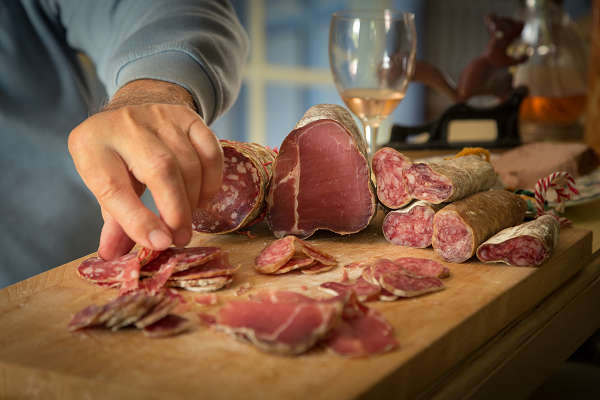Bulgarian meat delicacies or what to eat when drinking rakia?

Menu of each Bulgarian restaurant includes a section called “mezeta”, and it consists of snacks that perfectly suit traditional alcoholic beverages - wine and rakia. The most popular appetizer is the meat delicacies platter, different types of which are unique for each region of the country.
We’ve already written about meat dishes in restaurants of Bulgaria. And now it will be useful to remember about all the kinds of sausages and smoked-dried delicacies, which the Bulgarians make perfectly.
Meat preservation methods - salting, drying, smoking - have historical roots, and all the recipes are carefully passed down from generation to generation.
Let's figure out what to order in a restaurant to enjoy the wonderful combination of tastes of meat, wine and rakia, and whether it’s possible to buy it in a supermarket and serve on a holiday dinner table?
- Lukanka - dried cured sausage from a mix of pork and beef seasoned with salt, pepper and cumin. The origin of the name is quite interesting - in the 19th century, almost all rural residents were engaged in the making of homemade sausages. Sausage was made from pork, lamb, and goat meat. In those days, it was common to add onions (Bulg. “luk”) in pork sausages and garlic (Bulg. “chesan”) in lamb sausages. Therefore, they were called accordingly - "lukanka" and "chesanka". Nowadays onion is no longer added into sausages, but the name stuck.
- Pastrama – some people might know this dish by the name of “basturma”. The origin of the word is Turkish and means “pressed meat”. Pieces of pork, beef, and sometimes lamb are salted, covered in spices, sent under a press and dried. This delicacy is served sliced.
- Fillet Elena - this type of dried pork fillet comes from the town of Elena, Veliko Tarnovo region. Chunks of meat are salted, covered in a mix of pepper and spices and dried in the open air for several weeks. Locals believe that the right production of this delicacy is possible only in the vicinity of their city, because the clean air there has special magical properties.
- Sudzhuk - in terms of production, it’s similar to lukanka. The difference is in the added spices and the ratio of pork and beef. Sujuk is traditionally made in the shape of a horseshoe.
- Sushenitsa, Banski Starets, Strandjanski Dyado, Babek - types of dry sausages that are common in different regions of the country.
- Salam is a salami type sausage, a raw and dried product cooked according to the traditional southern European (Italian) recipe without adding typical Bulgarian spices.
- Shpek, shpekov salam - a kind of cooked smoked sausage, similar to servilat.
- Karvavitsa - blood sausage.
- Sazdarma - sausage from boiled or roasted meat with the addition of byproducts and jelly. The word is of Turkish origin.
- Shunka - originally, this word meant ready-to-eat jerked ham - beef, pork or even deer. Analogues of shunka in other European countries are prosciutto in Italy and jamon in Spain. Currently in Bulgaria, the name "shunka" is used for all kinds of boiled sausages and other ham made from pork, beef or poultry.
All of the above types of delicacies can be bought in stores. The choice is always great, prices are from 10 to 30 euros per kg or:
- Lukanka and sudzhuk - 1.5-2.5 euros per 100 g.
- Fillet Elena and pastrama - 2.5-3 euros per 100 g.
Popular restaurants of Bulgarian cuisine have their own proven suppliers of meat delicacies, so you can taste the most delicious lukanka right there. Feel free to order rakia and mezeta.
Cheers! Bon Appetit!
Read also:
 Where to find real steak in Bulgaria?
Where to find real steak in Bulgaria?
 Meat and meat dishes in the Bulgarian menu. Vegetarians, close your eyes!
Meat and meat dishes in the Bulgarian menu. Vegetarians, close your eyes!
 Winter holidays in Bansko. How to get there, where to sleep, what to try?
Winter holidays in Bansko. How to get there, where to sleep, what to try?